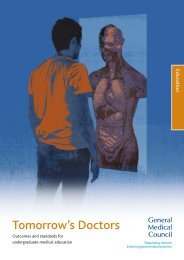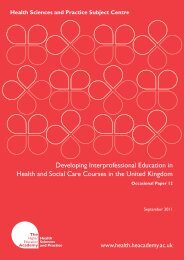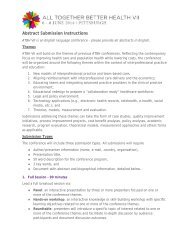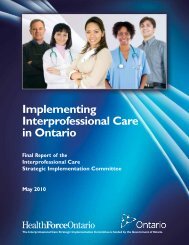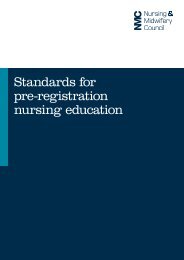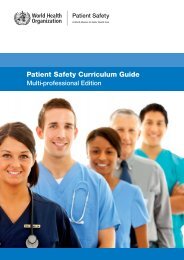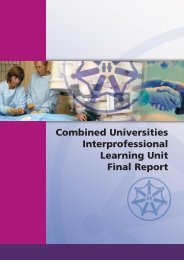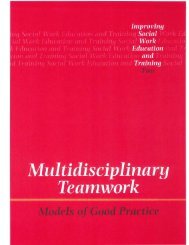Health and Social Care Policy and the Interprofessional ... - CAIPE
Health and Social Care Policy and the Interprofessional ... - CAIPE
Health and Social Care Policy and the Interprofessional ... - CAIPE
Create successful ePaper yourself
Turn your PDF publications into a flip-book with our unique Google optimized e-Paper software.
Code with <strong>the</strong> suffix ‘<strong>the</strong>se are <strong>the</strong> shared values of all <strong>the</strong> United Kingdom<br />
healthcare regulatory bodies’ (ibid: 3) leaving nurses <strong>and</strong> midwives in no<br />
doubt that o<strong>the</strong>r health professions must aspire to <strong>the</strong> same expectations.<br />
Partnership between patients or clients <strong>and</strong> <strong>the</strong> team that cares for <strong>the</strong>m is<br />
also emphasised (NMC, 2004b: Para 2.1) with <strong>the</strong> fur<strong>the</strong>r m<strong>and</strong>ate ‘you must<br />
communicate effectively <strong>and</strong> share your knowledge, skill <strong>and</strong> expertise with<br />
o<strong>the</strong>r members of <strong>the</strong> team as required for <strong>the</strong> benefit of patients <strong>and</strong> clients’<br />
(Para 4.3). Keeping records is viewed as a team communication tool (Para<br />
4.4) <strong>and</strong> <strong>the</strong> Code acknowledges that while ‘it is impractical to obtain consent<br />
every time you need to share information with o<strong>the</strong>rs’ (Para 5.1) nurses <strong>and</strong><br />
midwives must ‘guard against breaches of confidentiality by protecting<br />
information from improper disclosure at all times’ (Para 5.1). In essence this<br />
means that sharing information with o<strong>the</strong>rs, whe<strong>the</strong>r <strong>the</strong>y are nurses,<br />
midwives or members of any o<strong>the</strong>r profession, must be justifiable in <strong>the</strong> best<br />
interests of <strong>the</strong> patient.<br />
There is one fur<strong>the</strong>r reference in <strong>the</strong> Code to collaborative working with o<strong>the</strong>r<br />
team members ‘in order to promote health care environments that are<br />
conducive to safe, <strong>the</strong>rapeutic <strong>and</strong> ethical practice’ (Para 8.1).<br />
The UKCC first published <strong>the</strong> PREP H<strong>and</strong>book in 2001 <strong>and</strong> this is reviewed<br />
<strong>and</strong> updated by <strong>the</strong> NMC as new rules are implemented <strong>and</strong> evidence of best<br />
practise emerges. The NMC while acknowledging that continuing professional<br />
development (CPD) is ‘not a guarantee of competence, [it] is a key<br />
component of clinical governance’ (NMC, 2006: 3).<br />
PREP is a flexible framework that enables <strong>the</strong> practitioner to decide <strong>the</strong> CPD<br />
which best meets <strong>the</strong>ir professional needs… ‘There is no such thing as<br />
approved PREP (CPD) learning activity’ (ibid: 8). This flexibility thus enables<br />
practitioners to pursue interprofessional, interagency learning <strong>and</strong> still meet<br />
<strong>the</strong> PREP st<strong>and</strong>ard.<br />
The NMC produces st<strong>and</strong>ards of proficiency for <strong>the</strong> various professionals <strong>the</strong>y<br />
represent. In <strong>the</strong> St<strong>and</strong>ards of proficiency for pre registration nurse education<br />
(NMC, 2004c), one of <strong>the</strong> st<strong>and</strong>ards expected is that every nurse can<br />
‘demonstrate knowledge of effective inter-professional working practices<br />
which respect <strong>and</strong> utilise <strong>the</strong> contributions of members of <strong>the</strong> health <strong>and</strong><br />
social care team’ (ibid: 5) with ano<strong>the</strong>r being that <strong>the</strong> nurse can ‘Work in a<br />
team with o<strong>the</strong>r nurses, <strong>and</strong> with medical <strong>and</strong> paramedical staff <strong>and</strong> social<br />
workers related to <strong>the</strong> care of <strong>the</strong> particular type of patient with whom <strong>the</strong>y are<br />
likely to come into contact when registered at this level of <strong>the</strong> nurses’ part of<br />
<strong>the</strong> register’ (ibid: 6).<br />
One of <strong>the</strong> guiding principles for <strong>the</strong> st<strong>and</strong>ards of proficiency relates to <strong>the</strong><br />
management of care one aspect of which ‘involves <strong>the</strong> capacity to work<br />
effectively within <strong>the</strong> nursing <strong>and</strong> wider multidisciplinary team, to accept<br />
leadership roles within such teams, <strong>and</strong> to demonstrate overall competence in<br />
care <strong>and</strong> case management’ (ibid: 14).<br />
44




